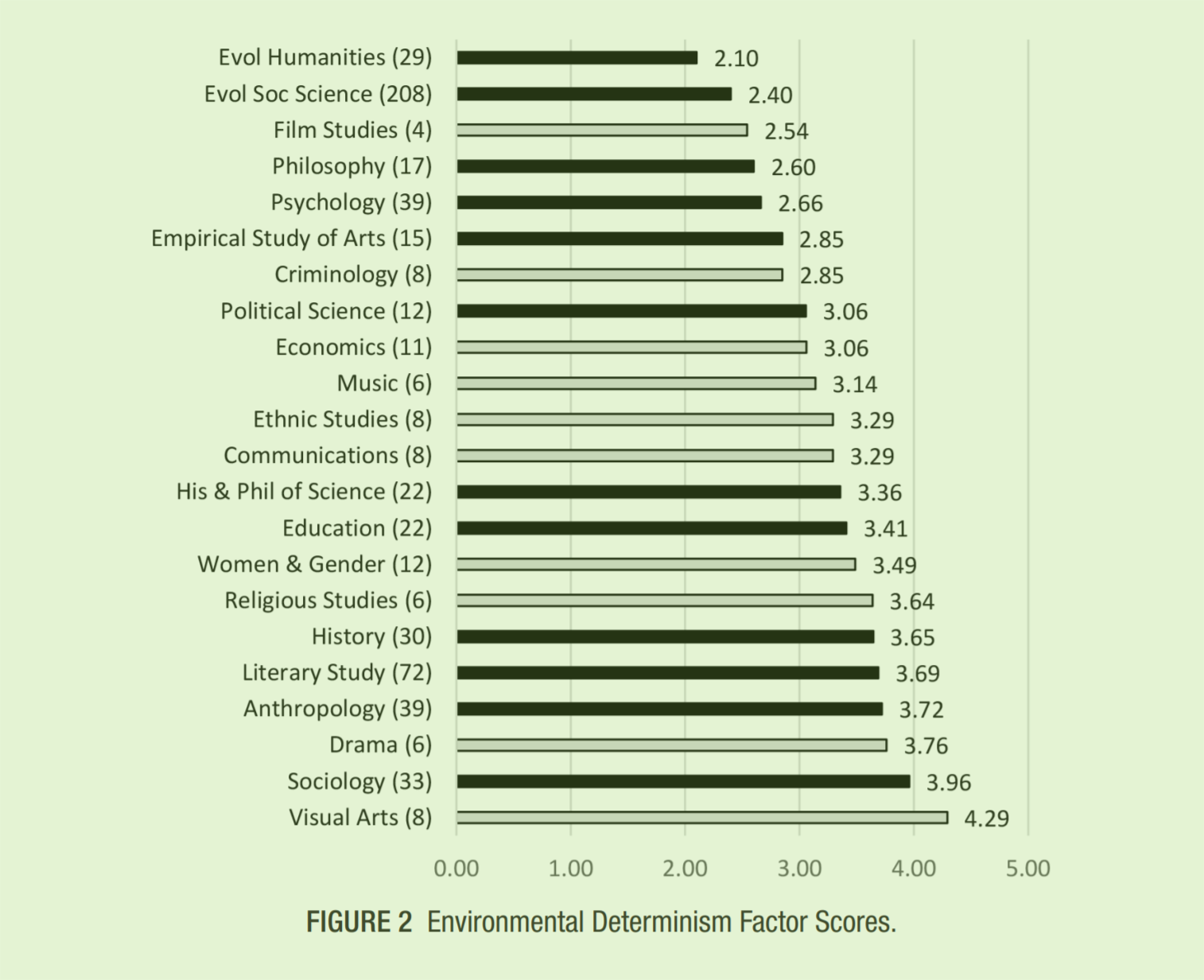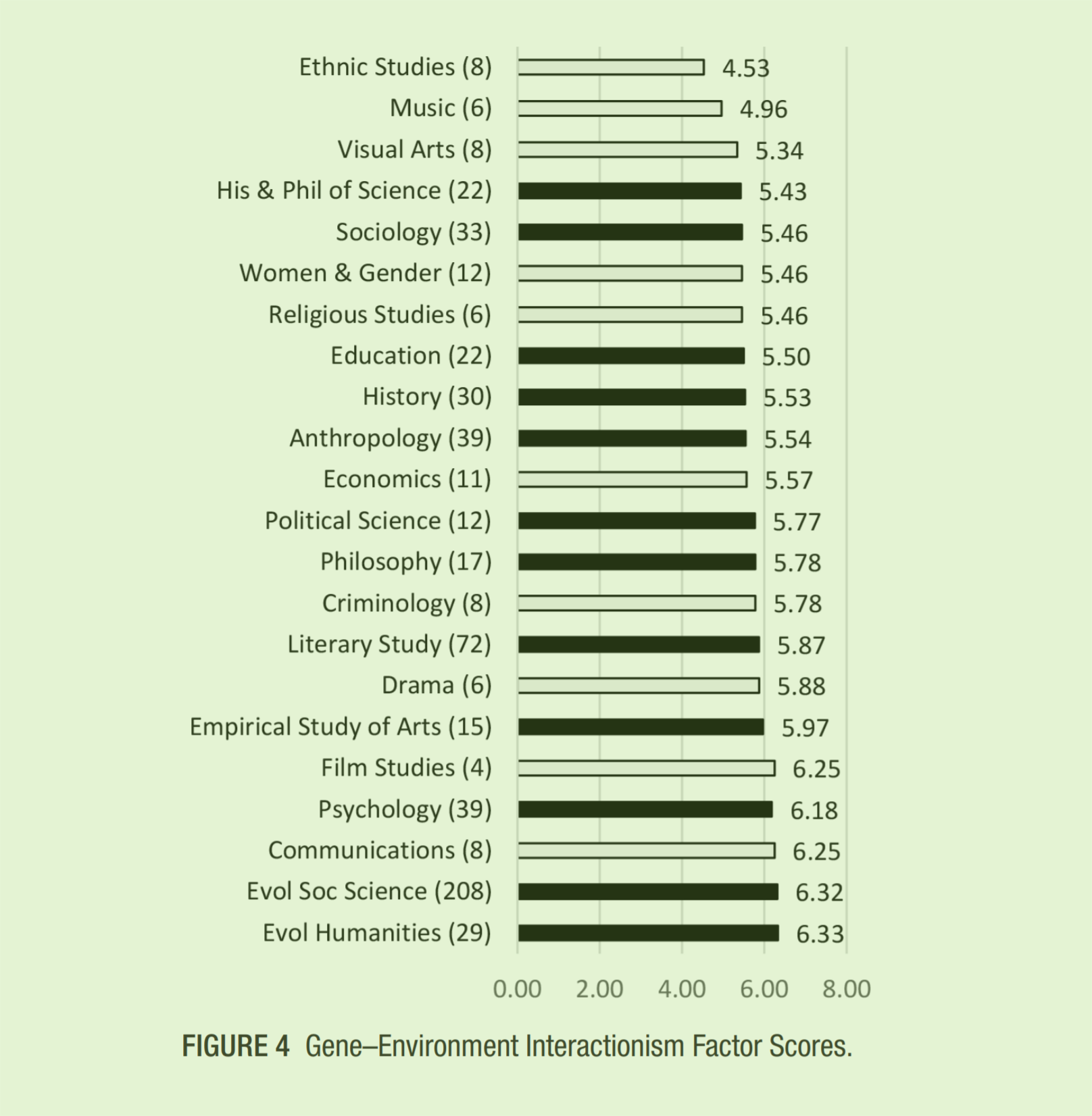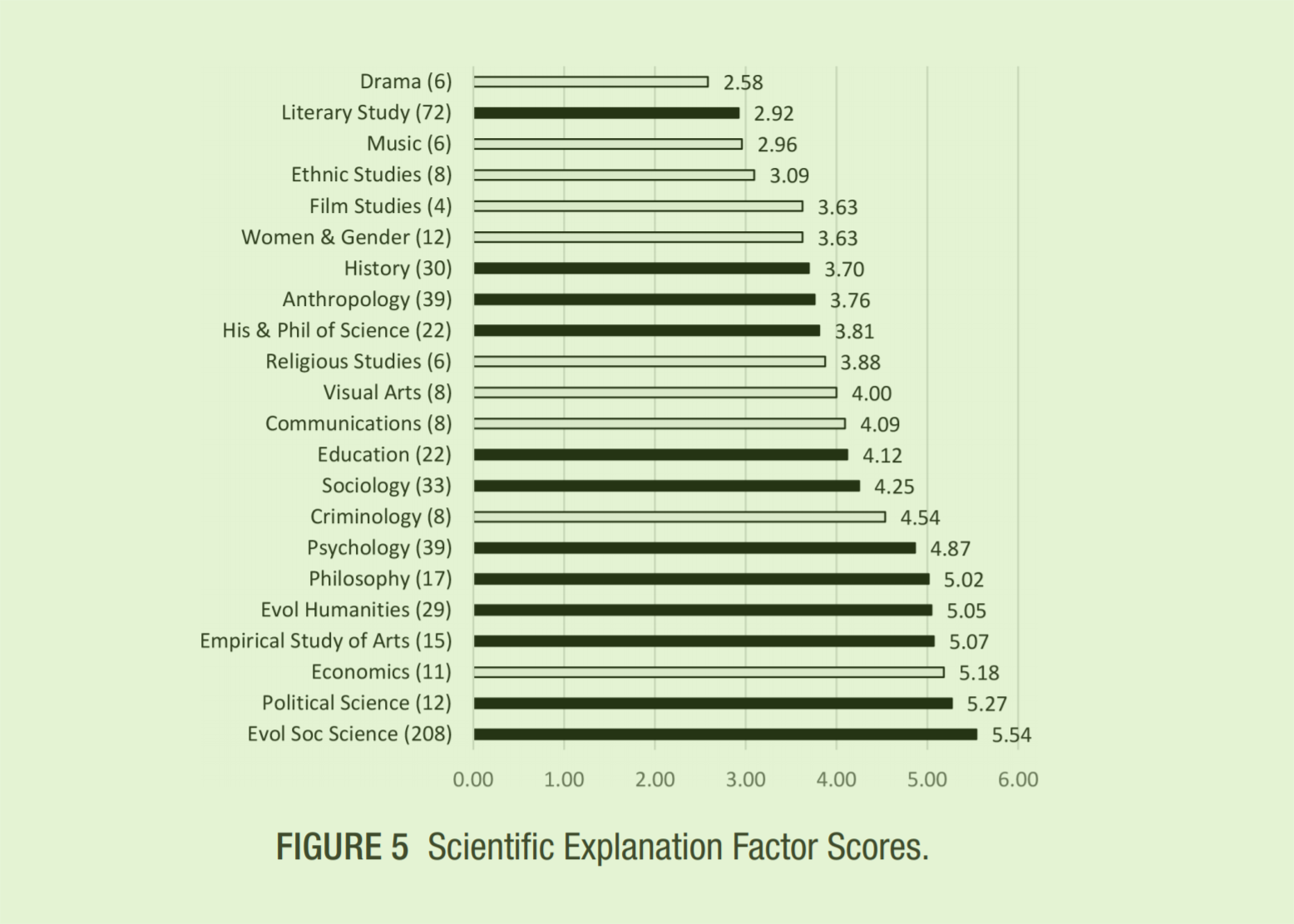Beliefs About Genetic & Environmental Determinism By Discipline
Evolutionary Studies in Imaginative Culture, a new journal, has published the results of a survey of academics, sorted by discipline, regarding their views about genetic and environmental determinism and the explanatory power of science.
The authors of “A Cross-Disciplinary Survey of Beliefs about Human Nature, Culture, and Science,” Joseph Carroll (Missouri), John A. Johnson (Penn State), Catherine Salmon (Redlands), Jens Kjeldgaard-Christiansen (Aarhus), Mathias Clasen (Aarhus), and Emelie Jonsson (Gotheburg), looked at four beliefs:
- Environmental Determinism: “the environment produces human behavior, values, beliefs, feelings, and gender identities and that culture operates independently of genetics.”
- Scientific Explanation: “science can explain nature, human behavior, imaginative artifacts, and subjective human experience.”
- Genetic Determinism: “genes produce human nature, behavior, values, beliefs, feelings, gender identities, culture, and the human life cycle.”
- Environmental Interactionism: “genes and environments [have effects] on each other and on human behavior, values, beliefs, feelings, and gender identities.”
The following figure (#2 from the paper) shows a ranking of disciplines according to belief in Environmental Determinism, from low to high. (On each of the following figures, the number of respondents in each discipline is noted parenthetically after the name of the discipline.)

from “A Cross-Disciplinary Survey of Beliefs about Human Nature, Culture, and Science” by Joseph Carroll, John A. Johnson, Catherine Salmon, Jens Kjeldgaard-Christiansen, Mathias Clasen, Emelie Jonsson
Figure 3, below, shows how disciplines compare on belief in Genetic Determinism, from low to high.

from “A Cross-Disciplinary Survey of Beliefs about Human Nature, Culture, and Science” by Joseph Carroll, John A. Johnson, Catherine Salmon, Jens Kjeldgaard-Christiansen, Mathias Clasen, Emelie Jonsson
Figure 4, below, ranks disciplines from high to low on Gene-Environment Interactionism.

from “A Cross-Disciplinary Survey of Beliefs about Human Nature, Culture, and Science” by Joseph Carroll, John A. Johnson, Catherine Salmon, Jens Kjeldgaard-Christiansen, Mathias Clasen, Emelie Jonsson
Lastly, Figure 5, below, shows the ranking of disciplines on an endorsement of Scientific Explanation.

from “A Cross-Disciplinary Survey of Beliefs about Human Nature, Culture, and Science” by Joseph Carroll, John A. Johnson, Catherine Salmon, Jens Kjeldgaard-Christiansen, Mathias Clasen, Emelie Jonsson
So, compared to academics in many other disciplines, philosophers are, on average, on the low end when it comes to belief in environmental determinism, a bit above the middle of the pack when it comes to belief in genetic determinism, about average in belief in genetic and environmental interaction, and towards the high end when it comes to confidence in scientific explanation.
What, if anything, should we make of this? For one thing, note that responses from only 17 philosophers were used in the survey. We might wonder how representative those 17 are. Additionally, as is evident from the number of respondent comments quoted in the article, there were multiple ways to interpret the survey questions and answers may indicate more of a difference in “emphasis” rather than a “qualitative difference.”
The authors write:
Are the social sciences and humanities moving toward consensus about the biological underpinnings of human behavior and cultural experience? If all the disciplines discussing these questions agreed on the validity of scientific evidence, some eventual consensus would seem more likely. The low regard in which science is held by disciplines that emphasize environmental causes suggests that there are no common criteria of epistemic validity by means of which the two groups—those who emphasize genetic causes and those who emphasize environmental causes, and especially cultural causes—could work toward a reasoned consensus.
The common willingness to affirm that behavior and experience are produced by interactions between genes and environments offers some prospect for reasoned debate. Even so, ambiguities and confusions over what is meant by that interaction—what culture is, where it originates, and how independent it is—are likely to impede rational agreement, and even rational disagreement, on some of the questions that most urgently concern social scientists and humanists: the causes of human behavior, the causes of variations in behavior, the sources of personal identity, and the sources of values, beliefs, and feelings. The degree to which science can illuminate these questions is itself an issue of central concern in both the social sciences and the humanities. The failure to reach agreement on that one question is the chief obstacle impeding rational debate on all the other questions. (p.27)
You can download the whole article here.


Well, to start, here is the statement that was provided to respondents: “Human behavior is produced predominantly or exclusively by environmental conditions, including cultural conventions.”
But here is the position that this question is supposed to measure: “Environmental Determinism: the environment produces human behavior, values, beliefs, feelings, and gender identities and… culture operates independently of genetics. ” And this is the position that Daily Nous has ascribed to people who agree with the statement (the authors are a little more cagey, talking of explanatory “emphasis” in their summary). But of course to say that culture is the predominant factor is certainly NOT to say that culture operates independently of genetics. There is no measure of “environmental determinism” here.
In any case, why not say that we have a healthy and lively debate about a question of explanatory emphasis? This is, so far as I can tell, exactly as things should be, given the current state of our knowledge. This is important: while we can do this with single-celled organisms, no-one has yet traced the chain of causes resulting in even a single adult human character trait, because we do not yet know how to do this. Reasonable disagreement is clearly possible on this one.
The Scientific Explanation question is so ambiguous that the results there are completely uninterpretable, in my opinion. “Science” and “explanation” are two terms that are likely to be used and understood quite loosely by people who aren’t in the business of thinking deeply about them, and amongst the people who *are* in the business of thinking deeply about them its controversial how they should be understood. Which combination of more-or-less fuzzy understandings of those terms one brings to the table will determine what question one thinks is even being asked.
And that’s even before considering whether someone interprets it as carrying the implicature than *only* science can explain these things.
I think that seeing the results of putting the same questions to a large group of philosophers would be interesting. I don’t have the resources for such a study but maybe some folks who have been surveying philosophers recently are set up to do something like that. There are issues with the questions, as pointed out in comments above, but re-writing them before doing such a study wouldn’t help fill in the Philosophy response profile to this particular study. Philosophers will likely separate by sub-discipline and it would be interesting to see how they do.